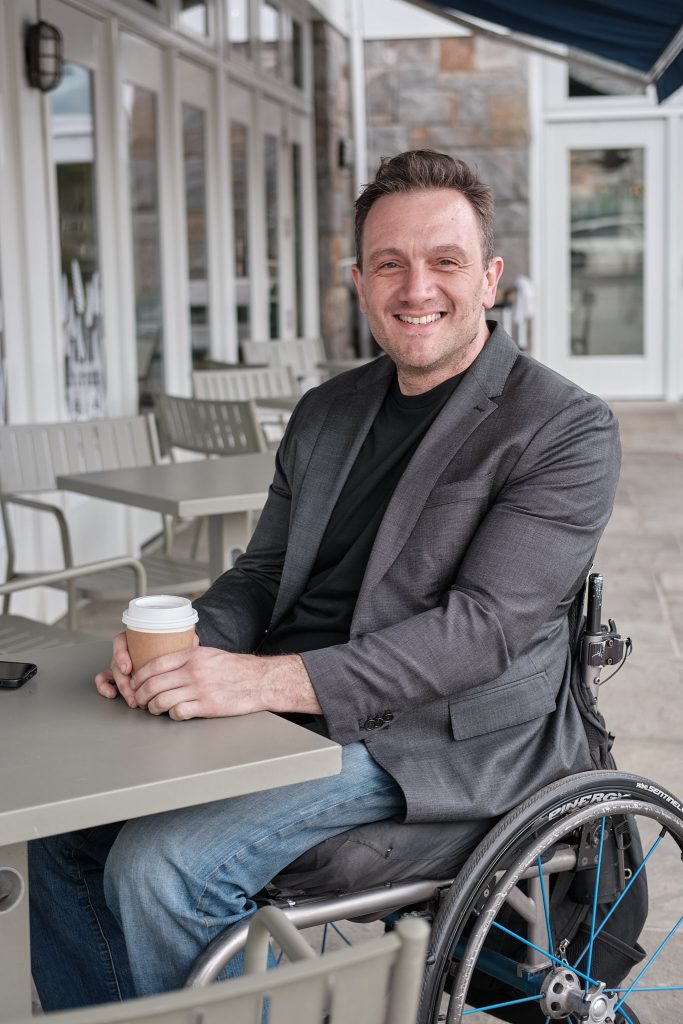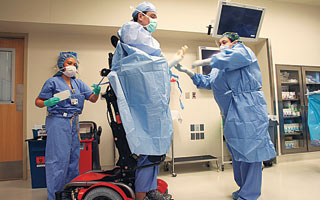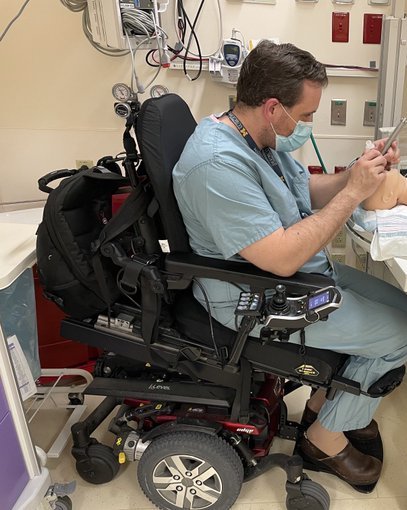← Back to SCI Member Spotlight
Mount Sinai’s Spinal Cord Injury Program Member Spotlight Interview Series features past and present Mount Sinai’s rehabilitation patients and members inspirational stories and life post SCI.

Christopher McCulloh
Dr. Christopher McCulloh, a surgeon who sustained a spinal cord injury, has continued to pursue his medical career despite being paralyzed. He underwent extensive rehabilitation at Mount Sinai Hospital, where his determination and the support of advanced rehabilitation programs helped him make significant strides in regaining his abilities. His story has been featured in numerous articles and TV segments, showcasing his use of a standing wheelchair to perform surgeries.
Dr. McCulloh’s journey exemplifies resilience and dedication to both his recovery and profession, serving as an inspiring testament to the power of perseverance and modern medical rehabilitation.
We reached out to Dr. McCulloh to interview him about his experiences after rehab at Mount Sinai and to gather his advice for recently injured patients and the spinal cord injury community as a whole. Dr. McCulloh emphasizes the importance of building a supportive network, addressing misconceptions about sexuality post-injury, and advocating for greater accessibility and inclusion.
Can you share a bit about your experience with your spinal cord injury? How did it happen?
My injury occurred more than fifteen years ago, in 2008. I was 28 years old, in my apartment in Brooklyn on a Sunday evening when I slipped. My body flew up into the air and my entire 6’ 3” frame came crashing down, with my neck hitting the edge of a very thick, heavy coffee table. I was knocked out for several minutes and when I came to, I realized that I couldn’t move my legs.
My phone was on top of my desk, several feet away. And I lived in a ground floor apartment, with a heavy iron gate. So I needed to call someone who had a key before I could even call 911, or they wouldn’t be able to get me out of the apartment. I used a cord I pulled out from the wall to lasso my phone, and pull it close enough for me to reach it.
I was taken to a trauma center, where they found my C7 vertebra had come completely out of my spine, and was lodged between C5 and C6. My spinal cord was making a figure 8. Despite attempts to restore the correct position using traction, every time they would let up on the traction, C7 would pop back out of place. What followed was an eight-hour surgery, where they had to fuse both my anterior and posterior spine, flipping me over in mid-surgery.
How has your life changed since the injury? What adjustments have you had to make?
I wish I could say that not much has changed, but really, everything changed. I am fortunate that my injury is incomplete, and after healing I am functionally more like a T6 para. But really I had to re-learn everything. It was like learning how to do life all over again – everything from how to get dressed, how to use the bathroom, how to shower, how to cook and clean. And those are just the logistical things, activities of daily living (ADLs). I had to re-discover my sexuality – not just the mechanics, but how my body responded differently. At times it was frustrating, at times it was exciting and surprising. I had to re-learn how to date, how to see and project myself as an attractive person capable of dating and having relationships. This all started with seeing myself in that way, which didn’t happen overnight. I’ve even had to learn that while my disability affects me, it also affects the people around me. It really was like having to rediscover everything I thought I know about life.
What are some of the biggest challenges you face on a daily basis because of your spinal cord injury?
One of the biggest daily challenges for me is simply mobility. While the MTA has recently finally started to work on subway accessibility, only 1/3 of subway stations are accessible. They are claiming plans for 95% accessibility by 2055, more than thirty years from now. Past behavior suggests this date won’t be hit. Which severely limits where we can easily live and go. Buses bridge the gap, but often significantly increase the time to get somewhere. Cabs are expensive, and it’s not feasible to be paying for cabs just to go out and live life. I often find a trip in the city takes twice as long as it does for someone able-bodied, and requires significantly more planning. Going to places with friends, going out to dinner, just doing the things that are part of social life.
I still find it frustrating when stores and bodegas pack so much stuff into their aisles that they aren’t wide enough to navigate for wheelchair users – it’s also a fire code violation.
There are a whole host of other things that I find challenging on a daily basis, even after more than sixteen years using a chair, but the intensity with which they bother me diminishes more and more over time. Otherwise I think I’d be miserable all the time, and that’s not how I want to live my life.
How has your injury affected your mobility? Are you able to move independently or do you require assistance?
I have an ASIA D SCI, C7 but functionally T6. Although I can walk very clumsily with a walker, it requires a massive amount of effort and is more of a workout rather than functional. I use a manual wheelchair as my primary means of mobility. I am independent, perhaps to a fault, and am able to get around, perform my ADLs, and live my life independently.
Have you undergone any specific treatments or therapies for your spinal cord injury? If so, what has been the most helpful?
The only thing I have tried has been Botox injections for clonus. I have bad clonus (rapid spasms in my calves) and I have been hopeful that Botox would help without muscle relaxants. I’ve only done two injections, so I am still hopeful of the benefit!
How do you manage pain or discomfort associated with your injury?
I have been fortunate that I don’t have neuropathic or other pain associated with my injury.
Have you found any assistive devices or technologies particularly helpful in your daily life?
My wheelchair is the most helpful! I wouldn’t be able to live or function in the world without it. It’s what allows me to live my life. I also have power chairs that I had acquired for work, which are helpful. One of them is a standing wheelchair, which has allowed me to get through medical school and work as a surgeon.
One of the most useful things day to day is a grabber that I acquired very early after my injury. It’s a small thing, but it enables me to still use higher shelves and get things off the floor that might otherwise be out of my reach. I think everybody should have one of these, disabled or not!

How has your social life been impacted by your injury? Do you find it difficult to participate in social activities?
This was probably one of the biggest challenges for me in adjusting to life with a disability. It is another one of those things where the disability not only affects me, but it affects my family, friends, and romantic partners. People in my life have had to learn how inaccessible the world is. And I am not great about asking for accommodations or asking people to change their plans because of me. I used to often feel guilty when bringing up my needs, or asking for accommodations or to change a venue because one wasn’t accessible. But like anything else, the more you do it, the more comfortable with it you become and the easier it gets.
Socializing with a disability is more challenging than without. You need to know if a particular venue is accessible or not. Do they have accessible bathrooms? How hard is it going to be to navigate the space once you’re there? Is there an easily accessible route to get to the venue, or is it nearly one of those 2/3 of subway stations that are not accessible? That bathroom… is it *really* accessible, or not? Plenty of places think a bathroom is accessible because there is one stall that has grab bars and has some extra space. But they didn’t think about the fact that the door only swings in. How do you get a chair into a bathroom stall when the door only swings into the space?
One of the biggest pieces of advice I give to people who have someone disabled in their lives is to not exclude them from activities. Engage and ask them about venues and activities. Don’t assume because of their disability that they won’t want to participate in certain activities. Allow the disabled person to actually assess and determine if venues are workable. Ask for their input early in the process. Make us feel included.
Socializing is certainly harder with a disability. I won’t paint a rosy picture and say, “oh, you can totally live a normal social life! It’s easy!” Because it’s not always easy. But it is absolutely worth the effort. Social activities are so important to living a normal, healthy life.
What advice would you give to someone who has recently experienced a spinal cord injury?
Find a mentor or mentors who are disabled. Seek out friends who are disabled. Build a personal network that you can draw upon when you face challenges and have questions. Having friends that I can reach out to when I’m annoyed, frustrated, or unsure about something is so, so important. Even if there’s no advice or guidance to be given, just to be able to complain about something and know that they just get it. The able bodied people in our lives mean well and they want to be as helpful as possible, but they just can’t understand what it’s like to live with a disability. Having those close connections who understand makes us feel like we’re not alone or isolated. I cannot possibly express how valuable these connections have been to me. In the beginning when I was just learning how to be disabled, and even now sixteen years later.

Are there any misconceptions about spinal cord injuries that you would like to address or clarify?
One of the issues that historically hasn’t gotten enough open discussion is sexuality. The misconception I would like to address is the misconception that people with SCI are not sexual people, or that we can’t live a happy, satisfying, fulfilling sex life! Nothing could be further from the truth! What I found so frustrating in the beginning was how hard it was to find good information and resources on sex after SCI. For years, the only real resource I came across was a grainy recording of a video tape that Kessler had made on sex back in the 90s – with the hair styles to prove it. The video itself is very good – it is candid, with discussion and video demonstration of couples engaging in sexual activity. But that is only the mechanics and a small piece of the greater story. I have had to piece together knowledge from various research papers and online forums – some of which no longer exist. I’ve found in a number of cases that I’ve had to educate physicians on a lot of the details.
I want to give a lot of credit to Natalia Mendez, Women on Wheels, Garrison, and Mount Sinai Rehab for some of the recent seminars they’ve put together on dating and sex after SCI. The information that was presented is information that took me years to discover on my own, and was life changing for me. We all need to be openly talking about this all the time!
Who is your favorite super Hero?
Batman! He’s got all the best toys.
